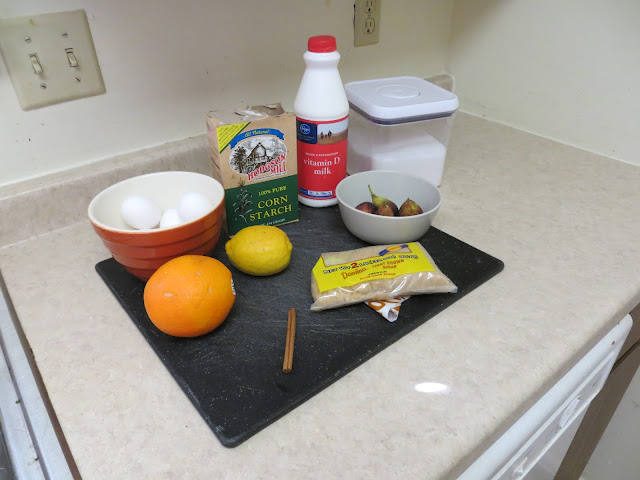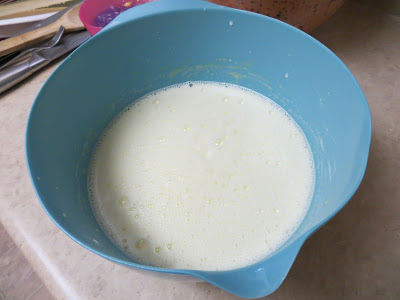My next recipe is for a sumptuous dessert: crema catalana. Crema catalana is a custard dessert, similar to crème brûlée, but it never goes in the oven! Crème brûlée has a tricky water bath in the oven that I have yet to master. If even a drop of water splashes into the ramekin, it's ruined! Crema catalana sets up in the fridge, so no problem!
Once again I'll be borrowing a recipe from my current favorite cookbook, Cocina tradicional española: primavera, verano, otoño e invierno, by José Pizarro.
This recipe for Catalan cream adds a special touch with caramelized figs on top. They add a unique look that could be either elegant or extraterrestrial!
 Ingredients:
For the cream
Ingredients:
For the cream
- 1L of whole milk
- 1/2 rind of a lemon, without any of the white pith
- 1/2 rind of an orange, without any of the white pith
- 1 cinnamon stick
- 6 egg yolks
- 1/4 c sugar
- 8tsp (or 2 2/3 Tbsp) of cornstarch
For the caramelized figs
- 4 figs
- 4 Tbsp brown sugar
Directions:
Put the milk, lemon and orange rinds, and cinnamon stick in a deep sauce pan over medium flame. Bring to a boil and then remove from the flame. Let sit for an hour. Once cool, pass the mixture through a fine sieve and discard the solids.
Beat the yolks and sugar to a foamy, pale consistency. Add the cornstarch, mix well to avoid clumps, and then add the milk mixture. Put this mixture in a deep sauce pan and cook it over medium flame, stirring constantly with a wooden spoon for 10 minutes until the mixture thickens. The mixture will be cooked when it leaves a thin layer on the back of the spoon.
Let this mixture cool slightly and then divide it evenly between 4 ramekins. Put the ramekins in the refrigerator and let sit 2 or 3 hours.
Cut the figs into fourths from the top to the bottom without cutting all the way through and put one fig on the top of each custard. (The fig should look like a flower sitting on top of the custard. Maybe it looks more like an alien flower, but it adds character.) Sprinkle brown sugar over the cream and inside the fig. Use a kitchen torch to caramelize the fig and melt the brown sugar. Use a steady flame and sweeping motions over the fig and brown sugar until it starts to crackle and melt. If you don't have a kitchen torch, the ramekins can be put under the broiler, but be careful not to burn the custards! (A torch allows much more control than a broiler could ever dream of!)
Serve immediately! Buen aprovecho!
Here are some pictures of the above process:
 |
| Milk, citrus rinds, and cinnamon stick in deep sauce pan |
 |
| Egg yolks and sugar |
 |
| Orange and lemon peels with some of the pith scraped out |
Using the rinds of citrus can be tricky. How do you get the rind off without any of the white pith? Well, carefully, to be honest. Use a small knife to score the peel and then peel it back. I then used a small spoon to scrape some of the white off, but I wouldn't get to worried or caught up on this step.
You can always zest, but zesting leaves a lot of usable flesh on the citrus. Since you'll be straining the mixture, bigger pieces of the rind won't affect the end product, but will add a lot of flavor while steeping!
As far as a kitchen torch goes, well, that takes practice. They're not easy to use and gauging the amount of sugar compared to the strength of the flame is difficult and it's all around a pain. But, even "bad" results are delicious! Unless it's burnt...then it's not so delicious. My suggestion, keep practicing! I will, too.

 Ingredients:
Ingredients:














I LOVE that recipe! Thank you!
ReplyDeleteYou are very welcome! Enjoy! :-)
Delete